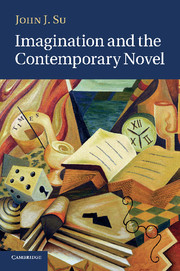Book contents
- Frontmatter
- Contents
- Preface and acknowledgments
- 1 Introduction: globalization, imagination, and the novel
- 2 Aesthetic revolutions: white South African writing and the State of Emergency
- 3 The pastoral and the postmodern
- 4 Hybridity, enterprise culture, and the fiction of multicultural Britain
- 5 Ghosts of essentialism: racial memory as epistemological claim
- 6 Amitav Ghosh and the aesthetic turn in postcolonial studies
- Conclusion: imagining together?
- Notes
- Bibliography
- Index
6 - Amitav Ghosh and the aesthetic turn in postcolonial studies
Published online by Cambridge University Press: 01 June 2011
- Frontmatter
- Contents
- Preface and acknowledgments
- 1 Introduction: globalization, imagination, and the novel
- 2 Aesthetic revolutions: white South African writing and the State of Emergency
- 3 The pastoral and the postmodern
- 4 Hybridity, enterprise culture, and the fiction of multicultural Britain
- 5 Ghosts of essentialism: racial memory as epistemological claim
- 6 Amitav Ghosh and the aesthetic turn in postcolonial studies
- Conclusion: imagining together?
- Notes
- Bibliography
- Index
Summary
While a renewed interest in aesthetics is apparent throughout the humanities, it is particularly striking in postcolonial studies. As recently as 2003, Deepika Bahri lamented what she saw as a “remarkable lack of a sufficiently developed critical framework for addressing ‘the aesthetic dimension’ (in Herbert Marcuse's words) of postcolonial literature.” For decades, the term aesthetics – when it appeared in scholarly discussions at all – signaled little more than opprobrium. Since the publication of Bahri's Native Intelligence: Aesthetics, Politics, and Postcolonial Literature, however, aesthetics has become a central preoccupation among postcolonial scholars, and books including Nicholas Brown's Utopian Generations (2005) and Ato Quayson's Aesthetic Nervousness (2007) signal a potentially significant shift in the field. Postcolonial studies first acquired disciplinary legitimacy, according to Robert Young, by devaluing the “aesthetic qualities” of a work and focusing instead on its depiction of “representative minority experience.” So, a reversal is not without significant risk. Modern notions of aesthetics, as they emerged in eighteenth-century European thought, were intimately linked to the intellectual and ideological justifications for worldwide colonial expansion. Focusing on the aesthetics of postcolonial literary texts thus risks denying cultural differences under a universalizing, Enlightenment discourse, drawing attention away from political concerns in favor of a rarefied formalism, and realigning the field with its most conservative forbears including Matthew Arnold, Edmund Burke, and T. S. Eliot, for whom aesthetics involved an elitist notion of “high culture” that devalued artistic works produced from Britain's colonies.
- Type
- Chapter
- Information
- Imagination and the Contemporary Novel , pp. 126 - 152Publisher: Cambridge University PressPrint publication year: 2011



